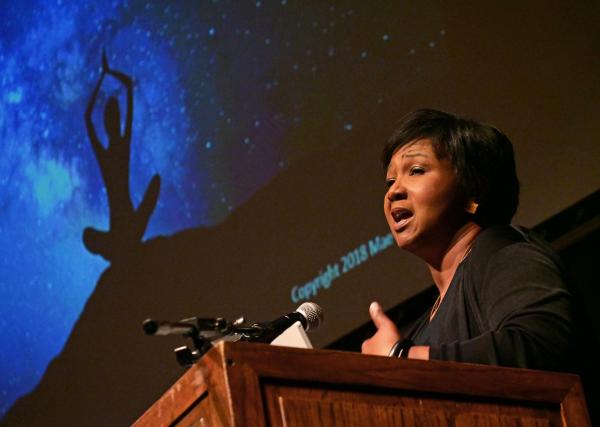
Mae Jamison addresses the audience during Tuesday’s talk. (Photo by Casey A. Cass/University of Colorado)
Physicist and astronaut Mae Jemison visited CU Boulder to share her dreams for interstellar space exploration and to encourage young people to be leaders in STEM fields.
Jemison made history in 1992 when she flew on the Endeavor as the first African-American woman to go into space. She started the lecture by asking the crowd to ask themselves when the last time they looked up was. Then she spoke about her own experience “looking up” as an astronaut.
She told the crowd that tomorrow will look like today if people settle for current conditions, and that people need to use what they learn in order to make it worth learning in the first place.
Jemison spoke about her project 100 Year Starship, is an organization dedicated to making humans capable of traveling outside of the solar system within 100 years.
As the principal of this program, Jemison’s job is to include other people to foster a place that alters the perception of space travel. According to Jemison, the way people think about space travel needs to change before going beyond the solar system can become a reality. A diverse group helps integrate elements like sustainability and human behavior in the plans for space travel.
Jemison related her experience with 100 Year Starship to being a leader in life, saying the most important part is “understanding the difference between leadership and power.” Leadership means galvanizing people toward something, not forcefully making them do something. She added that leadership also means being willing to listen, and being willing to step back from leading when needed.
“You don’t need to lead every time,” she said
Jemison has been a leader her whole life, attending Stanford University and Cornell University Medical College. After school, she went on to work as a medical officer for the Peace Corps, then became an astronaut for NASA.
Marsha Guess, a doctor with CU Denver, brought her family, including her two children, to hear Jemison speak.
“I brought my family… in hopes that it would be inspirational for them and for their futures,” Guess said.
The challenges facing human interstellar travel, Jemison argued, mirror human challenges on Earth. Everyone needs to recognize that they are earthlings and that the planet is shared.
“Space is not a plan B,” she said, emphasizing that since most people will not leave the Earth’s atmosphere, it should not be an escape route for humanity’s problems.
Jemison insisted that space exploration will reach its full potential after it has acheived diversity, including generational diversity. Without that, the technology that will take people further will not work effectively.
Drew Johnson, a high school senior from Denver, attended the event because she was interested in Jemison’s experience both in space and in the current cultural climate.
“It’s always cool to see women of color excelling in what they do,” Johnson said.
Jemison brought the group back to her original question, “when was the last time you looked up?” Sometime in Aug. 2018, her organization wants people around the world to look up and record how they are feeling to help strengthen human connection across the globe.
Charlene Porter, a former high school teacher, drove up from Denver to hear Jemison’s presentation.
“Jemison is an incredible inspiration, and to see her in person was a privilege and honor,” Porter said.
Jemison ended her speech noting the significance of personal empowerment.
“It doesn’t come from someone else, it comes from inside.”
Contact CU Independent News Staff Writer Makenna Sturgeon at makenna.sturgeon@colorado.edu.
